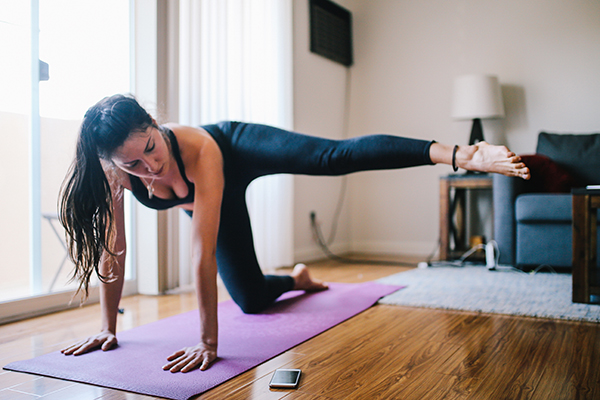10 Ways to Reduce Stress

Stress can manifest in so many different ways — a tense jaws, hunched shoulders, anxiety, and weight gain, to name a few.
But with just a little bit of effort, you can reduce your stress and tension not only on a daily basis but also at a physical level in both your mind and body.
Read on for 10 easy ways to help beat the daily stress in your life.
1. Meditate
Meditation can help reduce stress and anxiety, as it allows you the time to slow down, focus on your breath and body, and leave everything else behind.
One meta-analysis of meditation research found that mindfulness meditation programs did show small improvements in anxiety, mental wellbeing, and pain.
Starting a meditation practice is easy — you don’t need any equipment, and you can start with just 10 minutes a day using a streaming guided meditation, like Unstress.
2. Body awareness check-in
Take a few moments throughout your day to take stock of how your body feels.
Practice a body awareness check-in by scanning through the different parts of your body that may be holding stress, advises Diane Renz, a licensed professional counselor who utilizes Mindfulness-Based Stress Reduction (MBSR) in her practice and is the founder of Center for Healthy Habits.
Renz suggests focusing your thoughts on your eyes, face, jaw, neck, shoulders, lower back, and belly, as well as your breath.
Take deep breaths as you scan your body and bring awareness back to yourself. Practice this quick exercise a few times a day.

3. Digital detox
“Look at what you are consuming through social media, movies, books, magazines, and conversations,” says Stefanie Greenleaf, a licensed acupuncturist, yoga teacher, and certified advanced Chinese herbalist.
Think about what you need from the media, your relationships, and everyday conversations.
Does staying up with the news help you feel informed or anxious?
If you need a digital detox, start with one night a week or a half an hour a night where the phone, news, and social media is put away.

4. Laugh
Instead of scrolling through your social media feed, cue up some funny animal videos instead or watch your favorite comedy show.
Research shows genuine laughter can help decrease cortisol, the stress hormone, and increase endorphins, the happy hormones.
5. Eat healthy foods
Research shows that the foods you eat may have an influence on your mood.
More importantly, a 2017 study showed that improving your diet can help improve your mood.
Greenleaf is a fan of occasional cleanses to help you reset your diet, but not the kind that restricts your eating in an unhealthy way.
“Cleanses — not fasting — don’t need to be hardcore,” she says. “It’s really more about cleaning up your diet.”
A cleanse like 3-Day Refresh or Ultimate Reset can help you eliminate junk food from your diet so you can focus on nutrient-rich foods that fuel your body.

6. Sweat it out
Research shows that when you exercise, your stress levels decrease.
A 2019 study showed a decrease in cortisol for participants who exercised for 30 minutes of moderate- to high-intensity.
The study points out that both a regular exercise habit and one-offs contribute to lower levels of stress, so get moving!
At home? Try a streaming workout that you can do right in your living room. Prefer to get outside? Go for a guided run.
7. Go outside
Heading outside is a natural stress reliever. A recent study in Landscape and Urban Planning looked at the effects of a mindfulness-based stress reduction (MBSR) in an outdoor setting versus an indoor setting.
The results? People who practiced MBSR in a natural setting had longer-lasting mindfulness effects than the indoor group.
Other studies found that overall, being connected with nature offers more psychological well-being, meaningfulness, and vitality.
Next time you are feeling stressed, put on some sneakers or hiking boots, and head to your nearest natural green space.

8. Get creative
No matter what your artistic talents, allowing yourself the time to be creative and let loose can help benefit your psychological well being.
In Germany, a systematic review looked at participants who used creative art therapies specifically in art, music, dance and movement, and drama therapy.
The research found that 81 percent of the included studies reported less stress in the participants who let their creative side take over.
So grab your paintbrush or adult coloring book and get zen!
9. Aromatherapy
Sniffing specific scents, like lemon, eucalyptus, tea tree, and peppermint may help relieve stress.
Participants in a small 2017 study inhaled aromatherapy essential oil blends and reported lower perceived stress and depression, as well as better sleep quality.
10. Journal
Writing in a journal doesn’t have to be a long exercise. Rather, think of it is jotting down just a few thoughts as you reflect on the day.
Renz recommends asking yourself a few key questions: What was surprising to me today? What did I discover? What was a challenge? What would I like to investigate more? What am I ready to commit to?
Use these simple questions to tune into how you are feeling and where you have room to grow.
